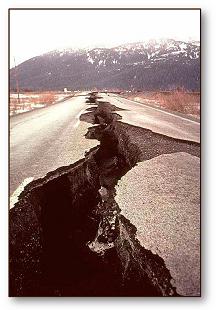Jesus and Creation: Jesus’ Resurrection and Creation
Jesus and Creation: Jesus’ Resurrection and Creation
 After our study of Jesus’ suffering and death in relation to creation, we will now think about the meaning of Jesus’ resurrection for creation.
After our study of Jesus’ suffering and death in relation to creation, we will now think about the meaning of Jesus’ resurrection for creation.
It strikes us that Matthew 28:2, also in connection with the resurrection, again expressly mentions a cosmic phenomenon: “there was a great earthquake”. In the Old Testament an earthquake is often a sign of God’s appearing (cf. inter alia Exodus 19:18, 1 Kings 19:11, and Psalm 114:7). This quake also points to divine intervention. It precedes the resurrection. It is as if God with His own hand breaks the shackles of death and grave and brings life to light. The revelatory character of this earthquake is still further enhanced by the appearance of a heavenly messenger. Everything points to a heavenly meaning of this event. Over the resurrection falls the matchless, glorious light of the victory that is being proclaimed. It is also a manifestation of the Lord’s power and majesty. The Saviour’s dying is felt within the realm of death. His resurrection announces the sheer glory and divine splendour of an unknown intensity.
This event shall affect the entire cosmos. We are faced here with the great turn-about in world history. Only because of the resurrection do we truly get a full view of the future, which waits and beckons.
Creation sighs in hope⤒🔗
So the sighing of creation (Romans 8) is no longer without prospect and hope. Rather, this moaning and groaning of creation expresses as labour pains the Christian expectation of the future. There is hope! This applies to the children of God, who have received the gift of first fruit from the Holy Spirit (see Romans 8:23). God’s great plan of salvation has an enormous extent and aims at more than only the redemption of human beings. The Holy Spirit, who is the Spirit of renewal, will not rest until God’s creation is again a cosmos, a beautiful ornament.
Our human understanding says: impossible! Look around – there is destruction everywhere. But then we think and reckon without, in faith, giving attention to the power of the resurrection. So we ignore the Holy Spirit with His unimaginable possibilities, and thereby greatly underestimate the great gift of the exalted Christ.
Jesus Christ is preached to us as the firstborn among many brothers. This implies, among other things, that through God’s work of redemption the restoration of the image of God becomes surely visible. The ultimate deliverance of the human being will have far-reaching positive consequences for the entire creation. And so verses 31-39 of Romans 8 already sing the song of victory, and the echo is caught by a sighing creation in a great longing. And this will turn out to be a well-founded expectation! There is no ‘perhaps’; only certainty, because nothing and no one shall be able any more to definitely and forever prevent or blockade God’s restoring love.
Jesus’ resurrection as powerful and saving deed of God guarantees this.
The full life beckons←⤒🔗
After the unique and reconciling suffering and death of the Saviour, glory comes incontestably, in spite of all tension and oppression of world- and church history. That is the perfect triumph of God’s plan of salvation with His world. This rescue is not simply an idea, but has the deepest point of concentration in the history of Jesus Christ’s cross and resurrection. He arose on the other side of death and grave; namely, in the realm of life! That is the sound, good and full life as it was meant by God in the beginning: life in every aspect of the word.
In Jesus’ resurrection lies the promise and warranty of God’s unimaginable pos sibilities. The irreversible beginning of the realisation is the empty grave, the resurrected one, and the Holy Spirit who works toward the finish. Then the new heaven and the new earth already come in view in the Bible.
sibilities. The irreversible beginning of the realisation is the empty grave, the resurrected one, and the Holy Spirit who works toward the finish. Then the new heaven and the new earth already come in view in the Bible.
We do need an eye sharpened by faith if we are really to discover the perspective and to learn to value it. There are many reminders of this throughout the Bible. The old prophecy of Isaiah offers a mighty view on the great future that God gives. Isaiah 11 sees wolf and lamb, leopard and young goat, calf and young lion not as insignificant creatures to be ignored, but places them harmoniously in God’s future. Isaiah 65:17-25 notices not only ‘new heavens’ which God creates but also a ‘new earth.’ There the jubilations about God’s acts of salvation are fully heard.
Jesus’ teaching offers a wide perspective. For the meek there is in Matthew 5:5 the promise that they will inherit the earth. Their hope and trust in God will not be put to shame (note Psalm 37:9 and 11). So the earth’s involvement is fully shown.
Perhaps we are so used to these beatitudes of the Saviour that we hardly realize what they say about the concrete effect of salvation also on earth. A Christian belongs with body and soul to Christ, and so there is also a promise for the bodily nature, especially because of what has taken place in the last Adam (1 Cor. 15:45b).
Here again we are reminded of God’s original purpose with His human creature and the world. Again we see the life-giving power of the Holy Spirit. We do not know exactly how it will be, but that the great future in all aspects will come is certain.
God’s people await←⤒🔗
2 Peter 3 is here an important text. It speaks emphatically about awaiting, according to God’s promise. The content of this expectation is not uncertain: “new heavens and a new earth”. Here we are reminded of what was said in Isaiah 65:17 and 66:22. We again have our questions: how new is that earth? Is there only a breach and final settlement with the past (cf. inter alia 2 Peter 3:5-7) or is there also continuity?
By means of the purifying judgment, the Lord renews His earth, so that it is again a proper dwelling place for Him. This perspective puts its stamp now already on Christians in their entire existence and in all aspects of life (cf. 2 Peter 3:11/14). And so the expectation is certainly also important for their relationship with God’s earth.
This can for the church be a beckoning and comforting perspective, especially in a time of oppression and persecution, when dark powers consider themselves more and more as lord and master on earth and when it seems that the beast has won the victory. At precisely such a time, God’s plan of salvation comforts the persecuted church. John was in Revelation allowed to see in a vision that paradise and the garden are there in the future.
It is therefore wrong to think that the expectations for creation are of little importance in God’s revelation. The great future for what has been created really belongs.
God receives all honour←⤒🔗
The restoration of God’s work of creation forms part of the crown of honour of the Triune God. We must ask ourselves as Reformed Christians whether we see the full extent of God’s recovered and recovering dominion.
It is striking that especially also in the songs in Revelation there is room for all of creation. The entire earth will again be a song of praise. Biblical and practical spiritual thinking about this must still, in large part, begin. But it is connected with the full awareness that all of life is a gift of God.
The biblical vision on life does not agree with our fragmented times, wherein especially technology and human control are considered important. The Bible shows us the way of God’s glorious plan of salvation. We see the connections from creation to final completion. Here Golgotha is a decisive junction and the garden of Joseph of Arimathea the salvation-historical turning point of the great breakthrough of life.
 As Christians we live ‘between the times.’ Our way runs today still through rocks and crags. One such rock is that of defeatism, resignation, hopelessness, and therefore the temptation to give up altogether. Nothing will get better on earth. The other rock is that of activism, whereby we think that we ourselves can bring about the kingdom on earth.
As Christians we live ‘between the times.’ Our way runs today still through rocks and crags. One such rock is that of defeatism, resignation, hopelessness, and therefore the temptation to give up altogether. Nothing will get better on earth. The other rock is that of activism, whereby we think that we ourselves can bring about the kingdom on earth.
The real pilgrim’s route is that of faith, hope, and love. If we follow it, faith in the Resurrected One gives us certainty about the all-encompassing future which is opening in Him. That faith also works through love. Here the Triune God receives the first and most honoured place. And then it necessarily follows that we exercise this love, as gift of the Holy Spirit, also with respect to the work of God’s hands.
Those who in faith see the resurrected second Adam stammer in wonderment: “O LORD, our Lord, how majestic is your name in all the earth!” (Psalm 8 and Hebrews 2:6-9). That is the language of the child that has seen the great deeds of God. It is a vision of faith that is hidden from the wise and intelligent. Those who truly see Jesus crowned with glory and honour find in Him and His victory everything for now and for the great future of heaven and earth.
This article was translated by Dr Freda Oosterhoff

Add new comment